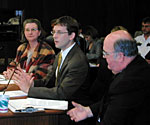By Laura McCallum
Minnesota Public Radio
November 5, 2001
Minnesota doctors and nurses say they need more supplies and training to deal with a bioterrorist attack. Two Minnesota House committees held a hearing on bioterrorism and key lawmakers say they want to alleviate public fear about anthrax and other forms of bioterrorism. But they say the Legislature will likely have to fill some gaps in the state's preparedness.
| |
|
|
|
||
John Hick, an emergency room doctor at Hennepin County Medical Center, told lawmakers that Minnesota hospitals don't have the equipment they'd need to treat a major disease outbreak. He says hospitals lack extra ventilators and antibiotics. They also need protective clothing for workers and better security.
Hick says if there was an epidemic of smallpox or another infectious disease, there probably wouldn't be enough hospital beds in isolated units.
"We need to look at cohorting those patients and isolating the ventilation to areas of hospitals, to think about designating separate facilities or a hospital, for instance, at the convention center, at Camp Ripley, in a hotel, in which there's a public interest, that could be taken over. None of these are great solutions because mainly what we need are intensive care beds," he said.
Doctors and nurses say they need more training in how to treat victims of bioterrorism. Some legislators say the state also needs quarantine guidelines to deal with a widespread outbreak.
Rep. Tom Huntley, DFL-Duluth, wants to give the governor power to declare a state of public health emergency. He plans to offer legislation authorizing such a declaration for a bioterrorist attack or fatal infectious outbreak.
Huntley says his legislation would allow health officials to quarantine infected people. "I realize that it's controversial. There are issues of your ability to move around freely, there's issues of privacy, there's issues of a person having the ability to refuse medical treatment if they wish. But in terms of the type of things that could happen - and I hopefully they never will - we need to be prepared," he said.
|
"We've got to lighten up a little bit. The nearest case is 1,000 miles away, and my staff is exhausted at times."
- Dr. Harry Hull, state epidemiologist |
Dr. Harry Hull, the state epidemiologist, agrees that the state needs a modern quarantine law. He says smallpox is a concern, because vaccination was stopped 30 years ago. Hull says says his office is closely monitoring hospitals and clinics around the state for any sign of a disease outbreak. He says there is no indication of anthrax exposure or any bioterrorism in the state.
"We've got to lighten up a little bit. The nearest case is 1,000 miles away, and my staff is exhausted at times. We've been deluged with phone calls," he said.
Hull's boss, Health Commissioner Jan Malcolm, says her office needs an additional $15 million to keep up with the demand for bioterrorism information, testing and training.
Rep. Fran Bradley, R-Rochester, who chairs the House Health and Human Services Policy Committee, says lawmakers will see what the federal government does first, and then fill in the gaps. "We may have to prioritize, we may not be able to do everything they ask, but I'm not at all bothered by front-line people who are there every day saying, we need some more, or we need more training, or those kinds of things. What I don't want to have to do is to see our Department of Health spending 90 percent of the time on scare stuff because people see a white powder someplace."
Bradley says legislative hearings should reassure the public that the threat of bioterrorism in Minnesota is very low. The Senate Health Committee holds a similar hearing on bioterrorism on Thursday.
More from MPR
